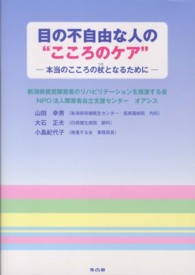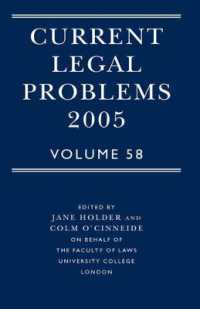- ホーム
- > 洋書
- > 英文書
- > Philosophy
Full Description
Causation is the main foundation upon which the possibility of science rests. Without causation, there would be no scientific understanding, explanation, prediction, nor application in new technologies. How we discover causal connections is no easy matter, however. Causation often lies hidden from view and it is vital that we adopt the right methods for uncovering it. The choice of methods will inevitably reflect what one takes causation to be, making an accurate account of causation an even more pressing matter. This enquiry informs the correct norms for an empirical study of the world.
In Causation in Science and the Methods of Scientific Discovery, Rani Lill Anjum and Stephen Mumford propose nine new norms of scientific discovery. A number of existing methodological and philosophical orthodoxies are challenged as they argue that progress in science is being held back by an overly simplistic philosophy of causation.
Contents
I. Science and Philosophy
1: Metascience and Better Science
2: Do We Need Causation in Science?
3: Evidence of Causation is Not Causation
II. Perfect Correlation
4: What s in a Correlation?
5: Same Cause, Same Effect
6: Under Ideal Conditions
7: One Effect, One Cause?
III. Interference and Prevention
8: Have Your Cause and Beat It
9: From Regularities to Tendencies
10: The Modality of Causation
IV. Causal Mechanisms
11: Is the Business of Science to Construct Theories?
12: Is More Data Better?
13: The Explanatory Power of Mechanisms
14: Digging Deeper to Find the Real Causes?
V. Linking Causes to Effects
15: Making a Difference
16: Making Nothing Happen
17: It All Started With a Big Bang
18: Does Science Need Laws of Nature?
VI. Probability
19: Uncertainty, Certainty and Beyond
20: What Probabilistic Causation Should Be
21: Calculating Conditional Probability?
VII. External Validity
22: Risky Predictions
23: What RCTs Do Not Show
VIII. Discovering Causes and Understanding Them
24: Getting Involved
25: Uncovering Causal Powers
26: Learning From Causal Failure
27: Plural Methods, One Causation
28: Getting Real About the Ideals of Science
Conclusion: New Norms of Science







